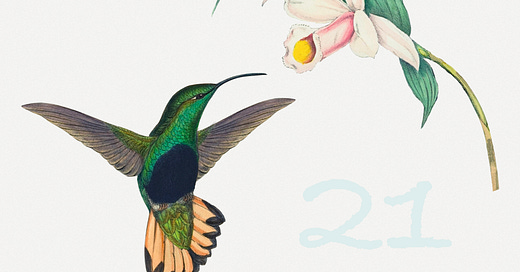Appreciation is a wonderful thing: It makes what is excellent in others belong to us as well. ~Voltaire
Creativity Prompt #21: Bone and Joy and Snarling | 30-Day Creativity Challenge
Hummingbird art print, remixed from artworks by John Gould and Henry Constantine Richte
With today’s creativity prompt, we’ll continue the work we began earlier this week with intuition then insight—including the work of strengthening our insightfulness by actively engaging our anterior cingulate cortex (ACC) brain region, which you can read more about in yesterday’s prompt below. The idea is, gratitude improves mood which helps prime the ACC, which in turn is associated with higher levels of insight and creativity. So, what better route to gratitude than writing an ode!?
All in all, this deep dive into the ode—this active leaning toward a state of joy—is a wonderful prompt for a Friday, the twenty-first day of our 30-Day April Creativity Challenge. I hope this prompt shines a beautiful light over your weekend, bringing you an infusion of levity and radiance. I also hope as always that if you are enjoying and valuing this creativity challenge, you might consider recommending or gifting a Writing in the Dark subscription to a friend. Every prompt from the 30-Day Challenge (along with all other posts) is archived indefinitely and can be worked at a person’s own pace. The prompts are also elastic and meant to be re-used an indefinite number of times. In fact, some of them serve best as daily practices.
And in that vein, some of you who have studied with me in the Writing in the Dark virtual workshop will likely recognize elements of today’s prompt, because it emerged from one of our 2022 WITD sessions, inspired by Brian Doyle’s ecstatic essay, “Joyas Voladoras,” and I’ve written about that essay once before in this newsletter.
Joyas Valadoras is a wildly ebullient ode, one that begins with a celebration of the hummingbird but soon widens its lens to herald the heart, especially and ultimately the human heart, and if you have never read it, oh my. You’re in for such a treat. This is the kind of maximalist writing that lifts you right out of yourself and launches you straight up and into the spirit of the world.
The prompt works best (by far) if you read and luxuriate in the full (very short) essay, but to whet your appetite, here is the opening:
Consider the hummingbird for a long moment. A hummingbird’s heart beats ten times a second. A hummingbird’s heart is the size of a pencil eraser. A hummingbird’s heart is a lot of the hummingbird. Joyas voladoras, flying jewels, the first white explorers in the Americas called them, and the white men had never seen such creatures, for hummingbirds came into the world only in the Americas, nowhere else in the universe, more than three hundred species of them whirring and zooming and nectaring in hummer time zones nine times removed from ours, their hearts hammering faster than we could clearly hear if we pressed our elephantine ears to their infinitesimal chests.
Also as part of today’s prompt we’ll hear from Doyle himself about how, during the writing of “Joyas,” the essay “spun away from him” into something else, which is what we’ll hope to invite into our own writing experience today. But it’s okay if we don’t end up writing anything close to the magic of “Joyas,” as long as we do in fact open ourselves to appreciative joy. After all, we’re building our anterior cingulate cortexes here, and that counts toward our creative growth, regardless of what actually lands on the page.
I find that if we can genuinely value process over product, we might end up shoulder deep in the good stuff far more often than if we focus too tightly and too soon on the product. After all, we can always (and easily) just write a collection of perfectly passable versions of the same sentences about the same stories we’ve written so many times before. It’s only when we push ourselves out of the nest, when we grasp, as Doyle tells us to do, after “bone and joy and snarling,” when we risk the terror of a free fall into the unknown … that we might finally fly. Of course, we might also land on our butts. But that’s what butts are padded for. We’ll survive if we make some useless messes, because it’s all about what we might discover in the process. Besides, even free fall is a way to fly.






